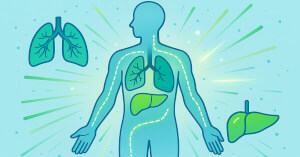
NAC
NAC is a precursor to glutathione, an antioxidant that supports detoxification, liver health, and respiratory function.
N-Acetyl Cysteine (NAC) is a precursor to glutathione, one of the body’s most important antioxidants. It supports detoxification, lung health, and immune defense.
NAC is also used in hospitals to treat acetaminophen overdose. It helps replenish glutathione levels and supports the body’s response to oxidative stress.
NAC is taken for respiratory health, liver support, and antioxidant protection. It is generally well tolerated but may cause mild digestive discomfort in some users.
Other names & forms of NAC supplement : n-acetyl cysteine (nac), nac, n-acetyl-l-cysteine, nac supplement, acetylcysteine
Possible Benefits
N-Acetyl Cysteine (NAC) is a precursor to glutathione, the body’s master antioxidant, and supports cellular detoxification by replenishing intracellular glutathione levels.
- Helps support Detoxification & Cleansing by enhancing phase II liver detoxification pathways and aiding toxin elimination.
- Promotes Liver Support through restoration of hepatic glutathione and reduction of oxidative stress in hepatocytes.
- May bolster Immunity by supporting glutathione-dependent immune function and reducing inflammatory cytokines.
- Provides Anti-Aging benefits by neutralizing free radicals and protecting cellular components from oxidative damage.
Side Effects
N-Acetyl Cysteine (NAC) helps replenish glutathione and support detoxification, but mild effects can occur as your system clears toxins. Watch for:
- Mild gastrointestinal upset, nausea or diarrhea, especially on an empty stomach
- Occasional headache or dizziness during initial use
- Possible mild skin rash or itching, hypersensitivity reactions
- Temporary mild bronchospasm in susceptible asthmatics
- Rare unpleasant sulfurous odor in breath or sweat
Interactions
Possible interactions include:
- Antioxidant therapies: NAC can interact with glutathione pathways; when combined with L-Glutathione, benefits are additive and generally safe.
- Cystic fibrosis medications: NAC’s mucolytic action may augment dornase alfa; coordinate with your pulmonologist.
- Anticoagulants: Rarely, NAC may impact platelet function; if on warfarin, monitor INR.
Precautions
Before adding NAC to your routine, confirm none of the following apply to you. If they do, consult your healthcare provider:
- Individuals with asthma or bronchospastic disorders: May trigger bronchospasm; use under supervision
- People on nitroglycerin or other vasodilators: NAC can potentiate vasodilation; monitor blood pressure
- Those with peptic ulcers: Can irritate gastric mucosa; take with food
- Pregnant or breastfeeding women: Limited safety data; best to avoid high-dose use unless directed
- Patients scheduled for surgery: Discontinue at least two weeks prior, possible interactions with anesthesia and bleeding risk
Studies
These studies provide scientific insights into NAC benefits:
A 2010 randomized, placebo-controlled trial in 60 type 2 diabetic patients showed 600 mg/day N-acetyl cysteine for 12 weeks improved insulin resistance index by 15% versus 5% with placebo and reduced oxidative stress markers.
A 2005 crossover study in healthy smokers reported that 1,200 mg NAC acutely increases glutathione levels and improves endothelial function .
A 2019 meta-analysis of five RCTs found NAC reduces symptom severity in psychiatric disorders , particularly in bipolar and schizophrenia.
No large-scale RCTs have evaluated NAC for respiratory viral prophylaxis or athletic performance, despite widespread off-label use.
Disclaimer: This page is for educational purposes and does not replace medical advice. If you're pregnant, have a condition, or take medication, speak with a qualified professional.











